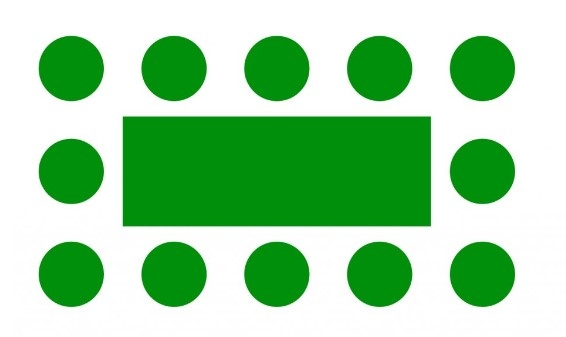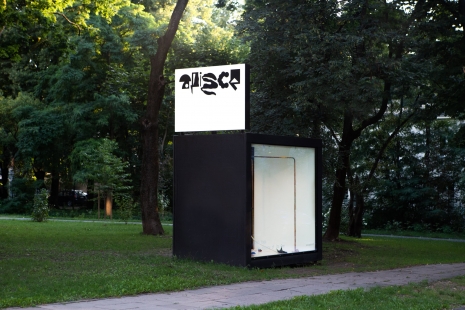As the author of the exhibition himself puts it: “That which makes you smile doesn’t have to be silly; that which is childish doesn’t have to be straightforward; that which is patriotic isn’t always majestic – because it can all be both cosy and tasty”. So, one could likened the exhibition presented at “apiece” gallery to a menu at a new restaurant inviting viewers to enjoy the urban delicacies “freshly” prepared by V. Suncovas.
apiece: Vladas, were the associations of urban elements with delicacies dictated by form or aesthetics, and why did the works veer towards a dessert menu rather than a main course menu?
Vladas Suncovas: Actually, the work has both desserts and main courses. There are also other elements of a carefully set table: cutlery, napkins, toothpicks, spices, glasses, uninvited guests, produce gone bad, abandoned items and much more. I also use the word “delicacy” rather loosely, just to describe something that is exceptionally tasty. The tradition of serving tables in different themes is very old and exceptionally rich. Looking through my “fridge of ideas”, I realised that I have a lot of urban models, sketches and ideas related to food in one way or another. So I decided that it would be appropriate to exhibit these ideas by loosely interpreting the concept of a served table.
a.: Your works tend to be two different things at once, since one can easily recognise in them connections between, and methods of, different artistic movements, as well as associations having ambiguous purposes and imagery. Why is it important for you not to be “trapped” in the field of representational art alone?
V. S.: For starters, I think the answer is encoded in your question: since I make objects containing multiple meanings, they readily find their place in different contexts. When I think of an idea for a new project, I feel most comfortable when I don’t limit myself to a preconceived notion of where and for what purpose it will be realised. When I think of a gazebo shaped as a clementine peel, I experiment with the shape and materials, I let my imagination tun in all directions. Once I’ve reached a certain point, I realise that in order to develop it further, I need to move on to the second phase, which is preparing a specific project for specific clients, specific locations, etc. I would develop it one way as scenography, another way as an architectural pavilion for a public space and yet another way for a private space. Or else the idea could be best expressed as a painting, sculpture or short story.
Secondly, exhibition “Urban Delicacies” presents my initial ideas that haven’t yet reached their final shape. Some of them might be realised in the future, some will change shape as they get developed further and some other of these “dishes” are perfectly expressed as scale models.
a.: Artwork-research “Urban Delicacies” is based on creative reflection on Lithuanian public spaces and is presented at a one-piece showcase-style gallery located in a public space. Does the choice of the exhibiting space expand the meanings of the work?
V. S.: I’m very happy about the opportunity to present my ideas in this particular space. I do believe that „apiece“ gallery expands the understanding of the work and provides it with a specific context. Speaking of urban public space while being in this space constitutes a unique opportunity. I believe that exhibition “Urban Delicacies” will be viewed by people of different ages, social status and worldviews. This is especially important if we are to have a sane dialogue leading to changes.
Vladas Suncovas graduated from Vilnius Academy of Arts (BA) and the Royal Danish Academy of Fine Arts (MA). He uses architecture, design and technology to create spaces and tools that they require. V. Suncovas develops his creative practice by making art in public spaces, scenography, exhibition design, small architecture, installations, experimental furniture and educational projects. His work is characterised by modular, deployable constructions, mechanical elements of engineering, parametric design, as well as transformation of space through conceptually based, often critical solutions.
Exhibition curators: Milena Černiakaitė and Aušra Trakšelytė
Graphic Design: Marek Voida
Communication: Menų Komunikacija
Exhibition funded by Lithuanian Council for Culture





